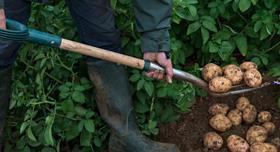
Growing consumer demand for organic is driving an uplift in farmers seeking organic conversion and signals growing confidence and interest in the organic sector.
The latest Organic Statistics for 2020 from Defra show an 11.6 per cent increase in certified organic land in conversion across the UK, a trend that has increased every year since 2014, with the exception of 2019.
Organic arable farming saw a seven per cent increase in 2020. This mirrors the performance across Europe where the number of producers and amount of organic land continues to rise in line with the EU’s ambition for 25 per cent of all agricultural land to be organic by 2030.
Soil Association Certification Senior Busines Development Manager Sophie Kirk said: “We welcome these UK stats from Defra which demonstrate positive growth and confidence in the organic sector. The volume of land currently under conversion to organic with Soil Association Certification has grown even more rapidly – showing a 24 per cent increase in the year to March 2021.
“The incentive for farmers to convert to organic is a direct response to: the significant and sustained growth in demand for organic produce through the pandemic; the availability of Government support for organic across some parts of the UK; the technological improvements in organics; and the growing interest amongst consumers and farmers for farming to provide more benefits for the environment and the climate.”
“The opportunity is now for UK Governments to incentivise the delivery of public goods such as clean water and air, improved biodiversity and reduced flooding through enhanced support for organic farming systems and practices.”
Data from the Soil Association’s Organic Farming and Growing - Does it Stack Up? Report (April 2021) revealed that net farm income is higher on organic arable and livestock farms compared to non-organic. Organic cropping farms generate five times the revenue per hectare from agri-environment schemes and 50% more revenue from diversification.
The UK organic market is now worth £2.79bn, seeing record growth in 2020 at 12.6 per cent (Soil Association Organic Market Report) – the ninth year of continuous growth – as more people trade up to British, sustainable food and drink. Products such as organic carrots, beef and lamb have seen strong uplifts in sales and many citizens have turned to local and national organic box schemes for a broad organic range.
Andrew Bullock, farm manager at Sezincote Farm - a 730 hectare mixed arable farm certified with Soil Association Certification - began organic conversion in 2019. He said: “We’re in the process of converting our farm to organic in a bid to make environmental improvements and control blackgrass within our arable rotation.
“We’ve received Countryside Stewardship funding to support conversion of the farm and are already receiving a premium for our in–conversion grains.
“The biggest positive for us in converting to organics is the reduction in risk. Previously we were spending more money upfront without knowing where arable prices would be. With organic the risks and input costs are less than non-organic farming, and farm profit is largely equal. I hope this will increase further once we are fully converted, while we will also deliver improvements to the environment, biodiversity and soil health.”
Organic production is currently funded and incentivised through agri-environment schemes in England and Scotland, which are currently open for applications.
However, with upcoming changes to agricultural support arrangements in 2024, the Soil Association is calling on UK Governments to take the opportunity to enhance support for organic farming practices and encouraging farmers to deliver public goods such as clean water and air, enhanced biodiversity and reduced flooding through enhanced support for organic farming systems and practices.



